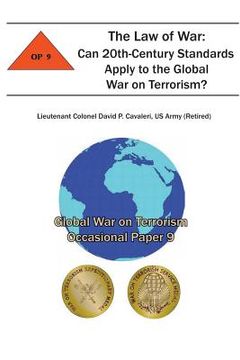The Law of War: Can 20th-Century Standards Apply to the Global War on Terrorism?: Global War on Terrorism Occasional Paper 9 (en Inglés)
Reseña del libro "The Law of War: Can 20th-Century Standards Apply to the Global War on Terrorism?: Global War on Terrorism Occasional Paper 9 (en Inglés)"
The Law of War: Can 20th-Century Standards Apply to the Global War on Terrorism? is the ninth offering in the Combat Studies Institute's (CSI) Global War On Terrorism (GWOT) Occasional Papers series. Mr. David Cavaleri, a retired Armor lieutenant colonel and CSI historian, has produced a study that examines the evolution and continued applicability of the corpus, both conventional and customary, that constitutes the law of war. As background, Mr. Cavaleri provides a theoretical framework and the development of the law within Western and, specifically, US Army doctrine and regulation. He then presents a case study of the British suppression of the Mau Mau insurgency in 1950s Kenya, a conflict with particular resonance today. Some of the more relevant characteristics of the "emergency," as it was called, include the clash between Western and non-Western cultures and an initially asymmetric fight between conventional security forces and loosely organized, poorly equipped insurgents. The genesis of this study is the public discourse, both explicit and implicit, asserting the possibility that the GWOT may require new rules and new law-of-war prescripts. This important discussion is fraught with complexities and long-term implications; the moral force in warfare is incredibly significant and any changes to the legal framework in place must be very carefully considered. Do we follow the law of war to the letter, do we remain "consistent with the principles of Geneva," or do we approach the conflict as a new challenge requiring fundamental revisions to the law? These are the options Mr. Cavaleri addresses, and we are pleased to contribute this Occasional Paper to the debate. In 1630 the first governor of Massachusetts, John Winthrop, wrote a sermon titled "A Model of Christian Charity" in which he enjoined his fellow colonists to make Boston a "city set on a hill." Subsequent political leaders, President Ronald Reagan for one, have periodically employed that image to portray the United States as a beacon of moral fortitude and Western character. This perception of the United States as a "shining city" creates a dilemma caused by the friction between the regulatory principles of the law of war as codified in the Geneva Conventions of 1949 and the military necessity of responding to non-Western tactics, techniques, and procedures (TTP) now encountered during the Global War on Terrorism (GWOT). This study is intended to generate discussion about the application of the law of war during 21st-century military campaigns conducted in the contemporary operational environment (COE). It combines a review of the documentary evolution of the law of war with a historical case study of the British experience in Kenya between 1952 and 1960 against the Mau Mau insurgents. It makes no claim that every lesson learned by the British during that counterinsurgency operation can be directly applied by the United States to the challenges of the GWOT, but this analysis does offer some insight about applying the law of war to an unfamiliar, non-Western environment. The debate concerning the law of war's applicability will grow more vocal as non-state enemies of the United States adapt TTP to exploit perceived centers of gravity like public opinion. In anticipation of that escalating debate, this analysis offers the following as its overarching question: Is the current version of the law of war suited to the COE in general and the GWOT in particular?

